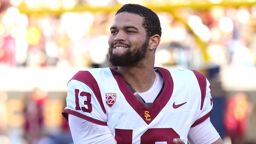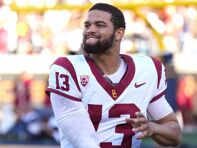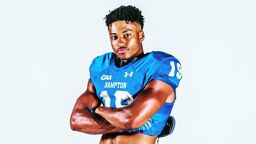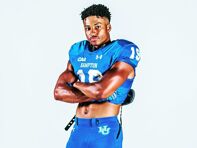When I came out to my football team at Texas Christian University in 1994, I didn’t do so to bring about any kind of change or to make a difference in anyone else’s life, much less to be an activist.
I was near the end of my college football career and I wanted to play football without the fear of being outed, which had held me back until this point. I never wanted to be a star football player because I knew the attention this would bring and I was concerned about what would happen if my sexuality was discovered.
But once I came out, I played the best football of my career. My team accepted me and I helped TCU secure a conference championship and go to a bowl game for the first time in 10 years. This was before the explosion of the Internet and any type of social media, so my coming out wasn’t news. There was no one to tell beyond my team and my family and friends, so I ended my football career satisfied that I was true to myself and played to my full potential.
It wasn’t until 17 years later that I told my story to Outsports. There was nothing that had held me back. I just didn’t realize my story could be of value to anyone.
In 2011 I remember feeling overwhelmed by what seemed like an epidemic of young gay teenagers dying by suicide as a result of bullying and harassment. I started to think that maybe by telling my story I could give someone hope. This was the first time I realized that my story might be able to make a difference. If I was able to come out as an African-American football player at Texas Christian University who set records and was respected by my peers, maybe this could encourage others who were struggling.
I also thought I could possibly make a difference in the world of sports, where at that time there were no other stories of openly gay football players at either the college or professional levels.
So I contacted Outsports and shared my story. The result was overwhelming. I was contacted by many young people who told me how much my story meant to them, and how it had inspired hope in them to live their lives and be true to themselves.
This was the first time I realized the power of visibility. As I was growing up, I didn’t have out gay role models to look up to. I didn’t have someone I could turn to as an example of what I hoped my life could become. But now my story was giving that hope to other people. So I shared my story with as many people as I could. I spoke at high schools and universities, always emphasizing the power and freedom that come from living your truth, and the power that visibility has for other people coming behind you.
When I moved to Houston in 2015, I learned that I could use my voice in a different way: to influence politics. Shortly after moving to Houston, I learned that the city’s recently enacted Houston Equal Rights Ordinance (HERO), which included protections based on sexual orientation and gender identity, was at risk of being overturned by a voter referendum. The existence of HERO, along with the support of Mayor Annise Parker, were the reasons my husband and I thought Houston would be a safe place to live. So when I learned this was in danger I knew I needed to get involved.
I joined the campaign to protect HERO and canvassed throughout the city to encourage voters to uphold this ordinance. Although this effort was defeated and HERO was overturned, I again realized the need for visibility. Much more needed to be done to educate the public about the need for protections for the LGBTQ community and I had a responsibility to be visible and to share my story with others as part of this effort.
But being visible isn’t enough. What I really learned through my involvement with HERO and subsequent political campaigns is that representation matters. No matter how visible I and others are, real change is only going to come when we are not only visible, but when we are represented at the table among those making policy decisions. I learned the blocking and tackling of politics: the recruiting, team building, and consensus building during the off season, and then the game-planning of setting a political agenda and executing it through the fall. This I understood.
Relatively quickly I was elected to the board of directors of the Houston GLBT Political Caucus, the oldest civil rights organization in the South dedicated to LGBTQ equality.
Now I am very excited to have been elected to the Board of Directors of LGBTQ Victory Fund. Victory Fund is the national non-partisan organization working to advance equality for the LGBTQ population by increasing the number of LGBTQ elected officials at all levels of government. In 2016, 87 of Victory Fund’s 135 endorsed candidates won their elections. And now as we’re about to enter the 2018 midterm elections, Victory Fund is supporting over 250 candidates who, if elected, can build our community’s political power and bring about real and lasting change.
As I think back on my time on the football team at TCU, I realize that coming out to my team was always about representation. Openly LGBTQ athletes should be represented in college and professional sports so that others have the courage to come out behind them. Openly LGBTQ professionals should be represented in leadership positions in businesses and corporations so others know it is safe to come out in the workplace.
Openly LGBTQ people should be represented across faith communities so others know they can live their lives authentically as a person of faith. And openly LGBTQ Americans should be represented at all levels of our government to represent our interests and be a voice for equality. I’m very excited and proud to be a part of this work and I hope others will join us in our efforts.
Learn more about Victory Fund here: https://victoryfund.org.
You can find Vincent Pryor on Facebook.
Edited by Cyd Zeigler.



































